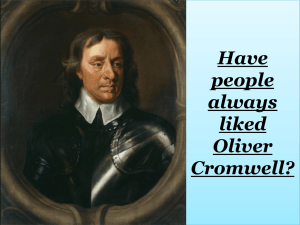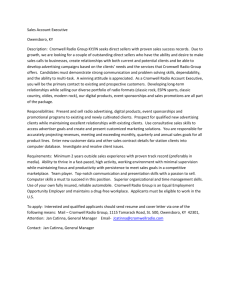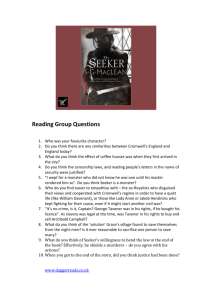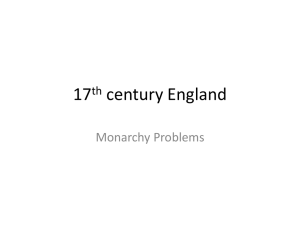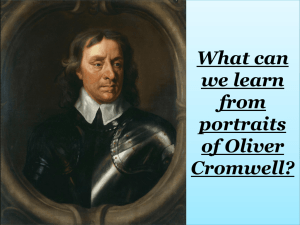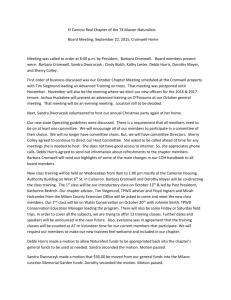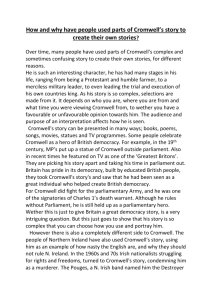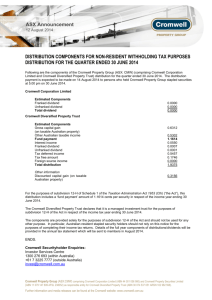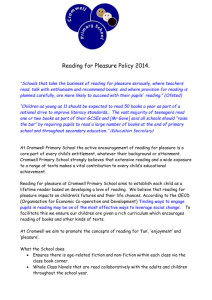Ancestor Richard Tapper, Oliver Cromwell and the Dorset Clubmen
advertisement
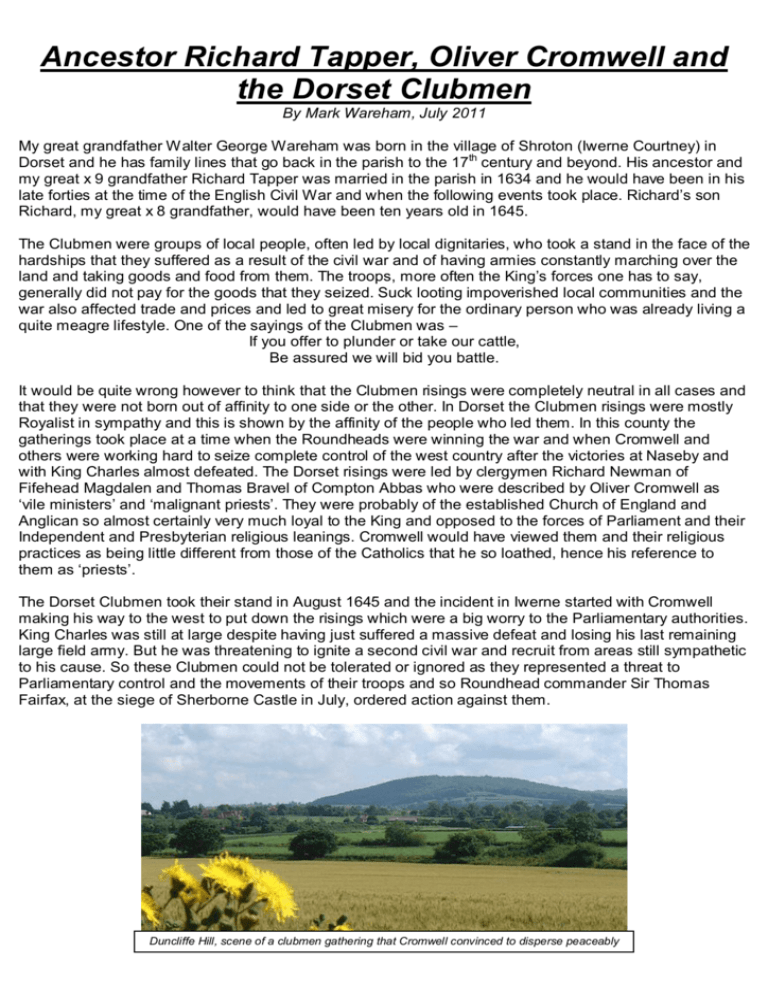
Ancestor Richard Tapper, Oliver Cromwell and the Dorset Clubmen By Mark Wareham, July 2011 My great grandfather Walter George Wareham was born in the village of Shroton (Iwerne Courtney) in Dorset and he has family lines that go back in the parish to the 17th century and beyond. His ancestor and my great x 9 grandfather Richard Tapper was married in the parish in 1634 and he would have been in his late forties at the time of the English Civil War and when the following events took place. Richard’s son Richard, my great x 8 grandfather, would have been ten years old in 1645. The Clubmen were groups of local people, often led by local dignitaries, who took a stand in the face of the hardships that they suffered as a result of the civil war and of having armies constantly marching over the land and taking goods and food from them. The troops, more often the King’s forces one has to say, generally did not pay for the goods that they seized. Suck looting impoverished local communities and the war also affected trade and prices and led to great misery for the ordinary person who was already living a quite meagre lifestyle. One of the sayings of the Clubmen was – If you offer to plunder or take our cattle, Be assured we will bid you battle. It would be quite wrong however to think that the Clubmen risings were completely neutral in all cases and that they were not born out of affinity to one side or the other. In Dorset the Clubmen risings were mostly Royalist in sympathy and this is shown by the affinity of the people who led them. In this county the gatherings took place at a time when the Roundheads were winning the war and when Cromwell and others were working hard to seize complete control of the west country after the victories at Naseby and with King Charles almost defeated. The Dorset risings were led by clergymen Richard Newman of Fifehead Magdalen and Thomas Bravel of Compton Abbas who were described by Oliver Cromwell as ‘vile ministers’ and ‘malignant priests’. They were probably of the established Church of England and Anglican so almost certainly very much loyal to the King and opposed to the forces of Parliament and their Independent and Presbyterian religious leanings. Cromwell would have viewed them and their religious practices as being little different from those of the Catholics that he so loathed, hence his reference to them as ‘priests’. The Dorset Clubmen took their stand in August 1645 and the incident in Iwerne started with Cromwell making his way to the west to put down the risings which were a big worry to the Parliamentary authorities. King Charles was still at large despite having just suffered a massive defeat and losing his last remaining large field army. But he was threatening to ignite a second civil war and recruit from areas still sympathetic to his cause. So these Clubmen could not be tolerated or ignored as they represented a threat to Parliamentary control and the movements of their troops and so Roundhead commander Sir Thomas Fairfax, at the siege of Sherborne Castle in July, ordered action against them. Duncliffe Hill, scene of a clubmen gathering that Cromwell convinced to disperse peaceably The following is a passage from ‘Dorset Life magazine, October 2010’ and refers to the first Clubmen gathering on Duncliffe Hill near Shaftesbury (picture above) “Oliver Cromwell himself, [led] a thousand dragoons… As they were passing Duncliffe Hill, a mile or two to the west of Shaftesbury, they noticed some colours flying from its peak and a scout was sent to investigate. He climbed to the top of Duncliffe, ‘a place full of wood and almost inaccessible’, and there he found a mob of Clubmen. Their leader was Richard Newman of Fifehead Magdalen, and when he learnt that Cromwell himself was at the bottom of the hill, he came down to explain that the Clubmen were only defending themselves from the continual plundering by both sides. At this point, Cromwell, according to several reports, made the strenuous twenty-minute climb to the top of Duncliffe to talk to the defenders in person. He was able to pacify the Clubmen sufficiently for them to return quietly and peacefully to their homes, ‘being very well satisfied and contented.’ Hambledon Hill which lies next to Shroton and which was the scene of the clubmen’s defeat Goodwin tells us more about the Clubmen on Hambledon Hill. “… the second gathering, between two and four thousand clubmen on the ancient earthwork of Hambledon Hill [pictured above], was not so obliging and refused to disband. At the bottom of the hill Cromwell’s men came upon a musketeer and asked him where he was going. He replied ‘to the club army’. When questioned as to what he was going to do there, the man replied that it had nothing to do with them: Being required to lay down his arms, he said he would first lose his life, but was not so good as his word, for though he cocked and presented his musket, he was prevented, disarmed and wounded but not killed. Cromwell asked to speak to the Clubmen in peace, but his men were shot at. He made a second request, but: “They still (through the animation of their leaders, and especially two vile ministers) refused. I commanded your captain lieutenant to draw up to them, to be in readiness to charge, and if upon his falling on they would lay down arms, to accept them and spare them. When he came near they refused his offer, and let fly at him; killed about two of his men and at least four horses … whereupon Major Desborough wheeled about; got in the rear of them, beat them from the work, and did some small execution upon them; I believe killed not 12 of them, but cut very Oliver Cromwell, by Samuel Cooper many, and we have taken about 300, many of which are poor silly creatures, whom if you please to let me send home, they promise to be very dutiful for time to come, and will be hanged before they come out again.” It is striking that despite serious concern about this rebellions Cromwell was relatively restrained in how he confronted a large and potentially dangerous force, most of who suffered no more than humiliatingly ‘sliding and tumbling down that great steep hill to the hazard of their necks’. Sixteen Roundhead prisoners, some of whom had been threatened with hanging, were freed, and among the Clubmen taken were four vicars and curates, who had been ‘at no divine service I can assure you’. The ‘malignant priests, who were principle stirrers up of the people to these tumultuous assemblies’ were Thomas Bravell of Compton Abbas , who had threatened to pistol any Clubmen who ran away, John Talbot of Milton Abbas, who remarkably was still in his living ten years later, and apparently worse of all, Lawford of Child Okeford. Together with the other prisoners, they were herded into the recently rebuilt Shroton church and kept there for the night. Next morning Cromwell took a list of names and examined the leaders. Then he lectured the entire group, warning them not to stop any soldier who was going about his business before sending all but a few away on promise of good behaviour.” St Mary’s Church, Shroton, where the Clubmen of Hambledon Hill were lectured by Oliver Cromwell In all about two to four thousand Clubmen were defeated by Cromwell’s relatively small force on Hambledon Hill. Certainly they had a harsh lesson in the true nature of conflict and battle and even though the Clubmen faced but a tiny part of New Model Army, their experience and discipline was too much for the much larger force of ordinary folk probably armed with nothing more that pitchforks and other agricultural implements. After Hambledon the Clubmen never proved a significant threat to Parliament again and their troops were able to travel without hindrance from the locals who knew that genuine power lay in the hands of the New Model Army. My ancestor Richard Tapper may well have been one of these ‘poor silly creatures’ on the hill that day in 1645 and may have come face to face with, arguably, our ‘chief of men’ Oliver Cromwell. If he was present then at least he did survive that incident and the war because he died aged 83 in 1680, living long after Cromwell himself had passed away and when the country was starting to get concerned again about the increasing Catholic sympathies of the restored monarchy. The line from Richard Tapper to my grandfather, Sidney Wareham is on the next page.
